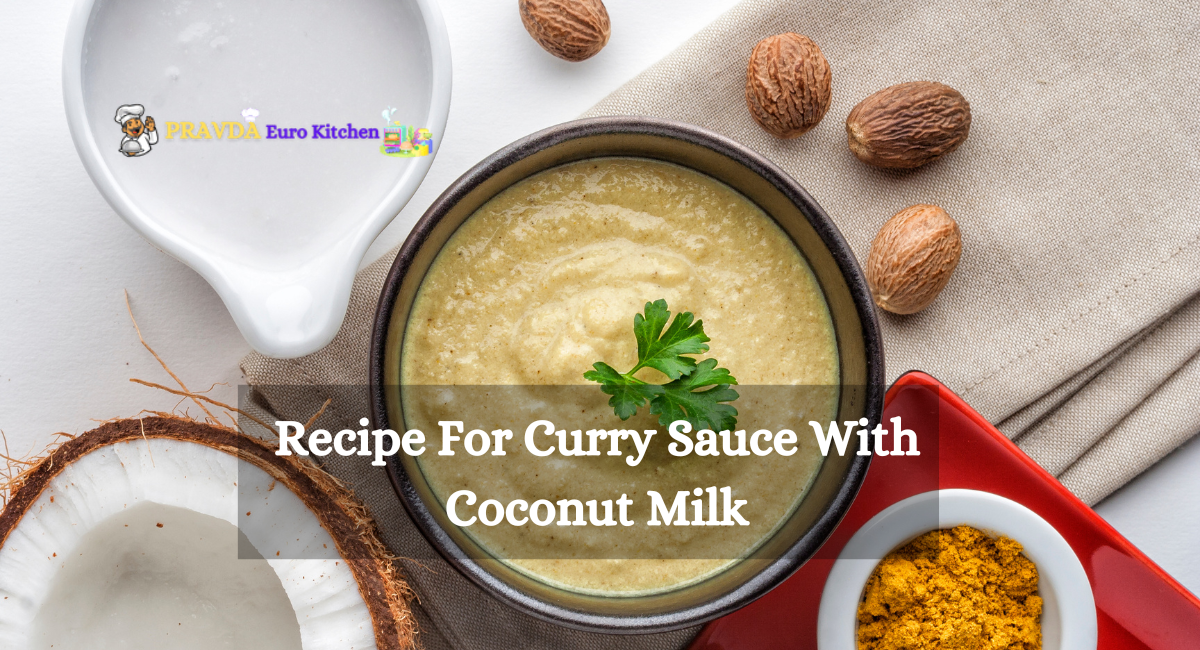This easy curry sauce made with coconut milk has essential ingredients, including fragrant spices like curry powder, cumin, and garam masala. The creamy coconut milk base provides a luscious, silky texture that’s perfect for drizzling over white rice, vegetables, or your protein of choice.
Recipe For Curry Sauce With Coconut Milk
Sure, here’s a basic recipe for a delicious coconut milk-based curry sauce that you can use with various proteins and vegetables. This sauce can be used as a base for chicken curry, vegetable curry, shrimp curry, or any other dish you like.
Ingredients
For The Curry Sauce
- One can (13.5 oz) of coconut milk
- 2 tablespoons vegetable oil or ghee
- 1 large onion, finely chopped
- 3 cloves garlic, minced
- 1-inch piece of fresh ginger, grated or minced
- 2 tablespoons curry powder (adjust to your spice preference)
- 1 teaspoon ground turmeric
- 1 teaspoon ground cumin
- 1 teaspoon ground coriander
- 1/2 teaspoon chili powder (adjust to taste)
- 1 can (14.5 oz) of diced tomatoes
- Salt to taste
- Freshly ground black pepper to taste
- 2 tablespoons fresh cilantro, chopped (optional, for garnish)
Optional Ingredients
- Protein of your choice (chicken, shrimp, tofu, etc.)
- Assorted vegetables (bell peppers, carrots, peas, etc.)
Instructions
- Heat the vegetable oil or ghee in a large pan or skillet over medium heat.
- Add the chopped onion and sauté for about 3-4 minutes, or until it becomes translucent.
- Stir in the minced garlic and grated ginger, and sauté for another 1-2 minutes until fragrant.
- Add the curry powder, turmeric, ground cumin, coriander, and chili powder to the pan. Stir well and cook for 1-2 minutes to toast the spices. Adjust the amount of chili powder to your preferred level of spiciness.
- Pour in the can of diced tomatoes (with their juices) and cook for 5-7 minutes, or until the tomatoes start to break down and the mixture thickens.
- If you’re using protein (e.g., chicken or shrimp), add it at this point and cook until it’s no longer pink (for chicken) or until it turns pink and opaque (for shrimp). If using tofu or cooked protein, you can add it later.
- Pour in the can of coconut milk and stir to combine. Reduce the heat to low and let the sauce simmer for 10-15 minutes, allowing the flavors to meld together. If you’re using vegetables, add them now and cook until they’re tender.
- Taste the curry sauce and season with salt and freshly ground black pepper as needed.
- Garnish with chopped cilantro if desired, and serve the coconut milk-based curry sauce over cooked rice, noodles, or bread like naan or roti.
Enjoy your homemade coconut milk-based curry sauce with protein and vegetables! You can customize this recipe to suit your taste by adjusting the spices and adding ingredients you love.
Top 6 Health Benefits Of Coconut Milk
Coconut milk is a creamy and delicious dairy-free alternative made from the flesh of coconuts. It adds flavor and texture to various dishes and offers several health benefits. Here are six of the top health benefits of coconut milk:
- Nutrient-Rich: Coconut milk is rich in essential nutrients, including vitamins C, E, B1 (thiamin), B3 (niacin), B5 (pantothenic acid), B6 (pyridoxine), and minerals like potassium, magnesium, phosphorus, and iron. These nutrients are essential for overall health and well-being.
- Heart Health: The medium-chain triglycerides (MCTs) found in coconut milk can support heart health by increasing HDL (good) cholesterol levels and reducing LDL (bad) cholesterol levels. This can help lower the risk of heart disease.
- Weight Management: MCTs in coconut milk have been shown to promote weight loss and support healthy weight management. They are easily digested and can increase feelings of fullness, reducing overall calorie intake.
- Bone Health: Coconut milk contains calcium and phosphorus, essential for maintaining strong and healthy bones. Regular consumption of coconut milk can contribute to better bone density and reduce the risk of osteoporosis.
- Digestive Health: The fiber content in coconut milk can aid digestion and promote a healthy digestive system. It can help prevent constipation and support regular bowel movements.
- Immune Support: Coconut milk contains lauric acid, a fatty acid known for its antimicrobial and antiviral properties. Lauric acid can help boost the immune system and protect against various infections.
It’s worth noting that while coconut milk offers several health benefits, it is also calorie-dense due to its high fat content. Therefore, it should be consumed in moderation as part of a balanced diet. Additionally, it’s important to choose unsweetened coconut milk, as sweetened varieties may contain added sugars that can negate some of these health benefits.
Thanks for reading
